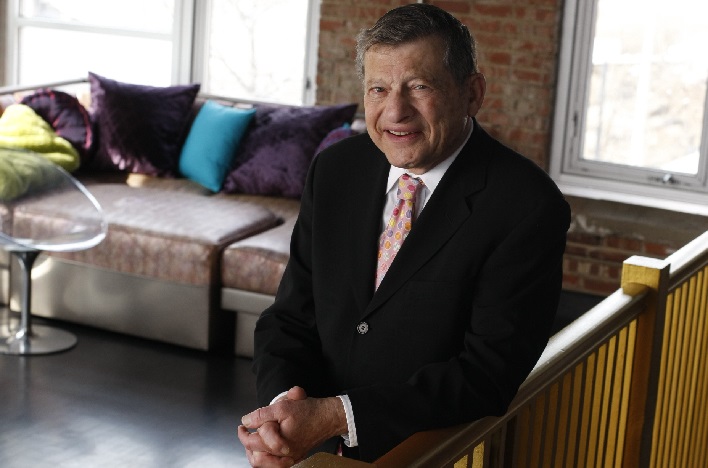Barnett Helzberg Jr. talks about 20 years of HEMP and what he learned from Ewing Marion Kauffman.
When Barnett Helzberg Jr. founded the Helzberg Entrepreneurial Mentoring Program 20 years ago, he was trying to pay back his mentor, Marion Labs founder Ewing Marion Kauffman, for more than 23 years of coaching.
Since then, HEMP has made a huge difference for hundreds of Kansas City’s small businesses. The nonprofit finds mentors for local entrepreneurs who’ve been around the block, but still need some advice.
The mentors—who happen to be some of the city’s most seasoned executives and business coaches—show the mentees how to overcome their stumbling blocks and be smarter, more effective managers.
“These are some of the people that want to grow their business, that are going to grow their businesses,” said Helzberg, the former chief of Helzberg Diamonds.
[ LINK: APPLE CO-FOUNDER STEVE WOZNIAK TO LEAD HEMP’S 20TH ANNIVERSARY GALA ]
He recently talked with Thinking Bigger Business about HEMP’s origins, how it helps small businesses and what he learned from Kauffman.
How did HEMP come together?
“One day as I thanked Kauffman, he said, ‘That’s OK, you’ll help somebody someday.’ … So I started talking to people about it. Most of them, they said, ‘You can’t do it.’ I messed around and talked to so many people for two years. And I finally looked in the mirror, and I said, ‘Either put up or shut up. Do it, or quit bothering people.’
“We had a meeting of prospective mentors. … Everybody there with one exception said they would be mentors. And it was really interesting. Because the one exception, and he’s a neat man, he said, ‘I think you’re just going to take people that are going to make it.’
“It reminds me of my friend who had had a couple of bypasses. The nurse came in the night before and said, ‘You’re going to be fine.’ So he says, well, how do you know? She says the doctor doesn’t take the ones that aren’t going to make it. Well, absolutely, we do want the people who are going to make it.”
What kind of business advice did Ewing Kauffman give you?
“One of the great things he did for me—and this is not standard wisdom in business—we’d talk about salaries. And he would encourage me and endorse me to pay people more, and take good care of them. Some people believe you pay as little as possible. He believed you pay as much as possible. And I think it helped me feel like, yeah, that’s the right thing to do. It gave me a lot of comfort.
“I’ll tell you another one … I really got into sending gifts to our top salespeople every month. I would sometimes go on foreign trips and bring (address) labels with me and send them gifts.
“(Ewing Kauffman) taught me a lot about that. He would send them a tea set, and a matching part the next year. I had a lot of fun and would buy a little something and send it to people. And then they could put it on their table and say my boss sent this to me, the company sent this to me, I was the top salesperson last month, last year.”
What makes a good mentor?
“I think being a good listener is a major part. … Here’s my example: My dad had a little black notebook, and he’s going to meet with (his attorney) Arthur Mag. Dad would wake up over and over and mark (notes) on this pad.
“And he’d go see him. ‘Well, here’s this deal, here’s what I think.’ And Mag would say, ‘Barney’—he called my dad Barney—‘that sounds good.’
“Dad would go through all 10 things, and he’d say, ‘Well, here’s what I thought of.’ Mag would say, ‘That sounds good.’ Dad says, ‘Why the hell do I pay you $100 an hour? I gave you all the answers!’
“I think the magic of it is, (mentoring) makes people think it out, verbalize, come up with some answers. I think the mentee has the answers.”
One of the big concerns when you started HEMP was the need to attract great executives as mentors. Has that been a problem?
“It has not been a problem, and I can’t believe the people we’ve got. They’re phenomenal. …
“I’ll tell you the secret, and I didn’t know it until two years ago. Two mentors have come to me and said, ‘You know why I’m doing this, you know why I’m interested?’ Because these are viable companies. They’re not startups. You know the likelihood of startups making it. That’s part of why we’ve got some incredible mentors.”
How does HEMP help the entrepreneurs who are being mentored?
“Part of the feedback that I’ve gotten from mentees is that this is the only place where they’re not supposed to go and brag about ‘we had the biggest year last year.’ Because our ethics are, No. 1, confidentiality and, No. 2, put your worst foot forward. Just what your folks didn’t tell you, right?
“And so they can open up. Ad nauseam, we repeat the confidentiality at almost every meeting. We have these lunches—Bill Reisler named them Lunch With the Big Guy, which I really like. I was so little, I was in kindergarten two years. I didn’t flunk, but they held me back. I was still the littlest kid in the class forever.
“We say at each lunch: Nothing goes out of the room. If James gives me permission to talk to Joe about it, fine. Otherwise, I can’t divulge. I have not heard of a violation in 20 years.”
What do you enjoy about HEMP?
“What I love is, they’re great people. … I’m with these people with these dynamite businesses that are coming up with ideas. They’re exciting. People say it’s generous. I say not at all, it’s a very selfish deal. I’ve never had so much fun in my life.”

